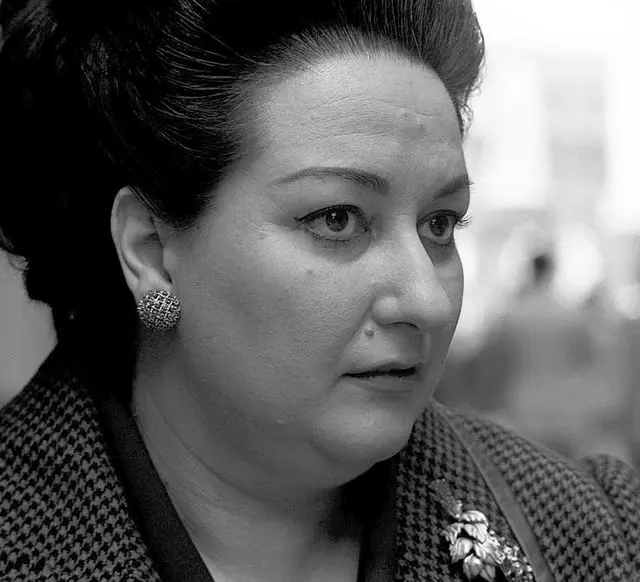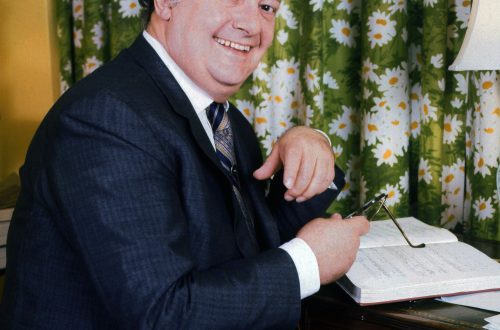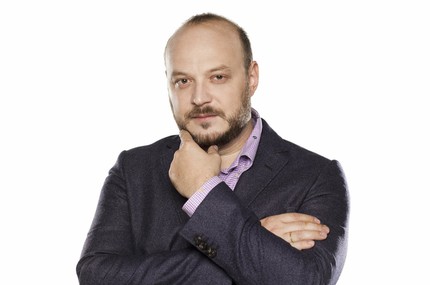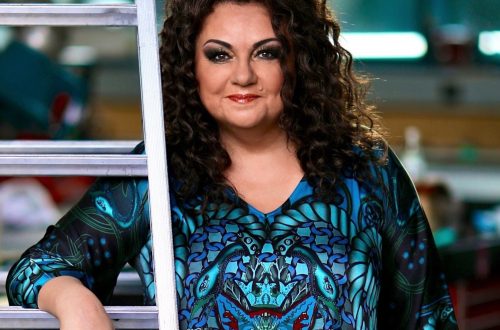
Montserrat Caballé |
Montserrat Caballé
Montserrat Caballe is rightly called today a worthy heiress of the legendary artists of the past – Giuditta Pasta, Giulia and Giuditta Grisi, Maria Malibran.
S. Nikolaevich and M. Kotelnikova define the creative face of the singer as follows:
“Her style is a combination of the intimacy of the very act of singing and high passions, a celebration of strong and yet very tender and pure emotions. Caballe’s style is all about the joyful and sinless enjoyment of life, music, communication with people and nature. This does not mean that there are no tragic notes in her register. How many she had to die on stage: Violetta, Madame Butterfly, Mimi, Tosca, Salome, Adrienne Lecouvrere … Her heroines died from a dagger and from consumption, from poison or from a bullet, but each of them was given to experience that single moment when the soul rejoices , filled with the glory of its last rise, after which no fall, no betrayal of Pinkerton, no poison of the Princess of Bouillon is any more terrible. Whatever Caballe sings about, the promise of paradise is already contained in her very voice. And for these unfortunate girls whom she played, royally rewarding them with her luxurious forms, radiant smile and planetary glory, and for us, lovingly listening to her in the semi-darkness of the hall with bated breath. Paradise is close. It seems to be just a stone’s throw away, but you can’t see it through binoculars.
Caballe is a true Catholic, and faith in God is the basis of her singing. This belief allows her to ignore the passions of theatrical struggle, behind-the-scenes rivalry.
“I believe in God. God is our creator, says Caballe. “And it doesn’t matter who professes what religion, or maybe doesn’t profess anything at all. It is important that He be here (points to his chest). In your soul. All my life I carry with me what was marked by His grace – a small olive branch from the Garden of Gethsemane. And along with it is also a tiny image of the Mother of God – the Blessed Virgin Mary. They are always with me. I took them when I got married, when I gave birth to children, when I went to the hospital for surgery. Is always””.
Maria de Montserrat Viviana Concepción Caballé y Folk was born on April 12, 1933 in Barcelona. Here she studied with the Hungarian singer E. Kemeny. Her voice attracted attention even at the Barcelona Conservatory, which Montserrat graduated with a gold medal. However, this was followed by years of work in minor Swiss and West German troupes.
Caballe’s debut took place in 1956 on the stage of the Opera House in Basel, where she performed as Mimi in G. Puccini’s La bohème. The opera houses of Basel and Bremen became the main opera venues for the singer for the next decade. There she performed many parts “in operas of different eras and styles. Caballe sang the part of Pamina in Mozart’s The Magic Flute, Marina in Mussorgsky’s Boris Godunov, Tatiana in Tchaikovsky’s Eugene Onegin, Ariadne in Ariadne auf Naxos. She performed with the part of Salome in the opera of the same name by R. Strauss, she performed the title role of Tosca in G. Puccini’s Tosca.
Gradually, Caballe begins to perform on the stages of opera houses in Europe. In 1958 she sang at the Vienna State Opera, in 1960 she first appeared on the stage of La Scala.
“And at that time,” says Caballe, “my brother, who later became my impresario, did not allow me to relax. At that time, I was not thinking about fame, but above all I was striving for real, all-consuming creativity. Some kind of anxiety was beating in me all the time, and I impatiently learned more and more new roles.
How collected and purposeful the singer is on stage, how disorganized she is in life – she even managed to be late for her own wedding.
S. Nikolaevich and M. Kotelnikova tell about this:
“It was in 1964. The first (and only!) marriage in her life – with Bernabe Marta – was to take place in the church at the monastery on Mount Montserrat. There is such a mountain in Catalonia, not far from Barcelona. It seemed to the mother of the bride, the strict Donna Anna, that it would be very romantic: a ceremony overshadowed by the patronage of the Reverend Montserrat herself. The groom agreed, the bride too. Although everyone thought to himself: “August. The heat is terrible, how are we going to climb there with all our guests? And Bernabe’s relatives, frankly, are not of the first youth, because he was the youngest in a family with ten children. Well, in general, there is nowhere to go: on the mountain so on the mountain. And on the day of the wedding, Montserrat leaves with her mother in an old Volkswagen, which she bought with the first money, even when she sang in Germany. And it must happen that in August it rains in Barcelona. Everything pours and pours. By the time we got to the mountain, the road was rough. The car is stuck. Neither here nor there. Stalled motor. Montserrat tried to dry it with hairspray. They had 12 kilometers left. All the guests are already upstairs. And they are floundering here, and there is no chance to climb up. And then Montserrat, in a wedding dress and veil, wet, at least squeeze it out, stands on the road and begins to vote.
For such a shot, any paparazzi would now give half his life. But then no one knew her. Passenger cars indifferently drove past a large dark-haired girl in a ridiculous white dress, frantically gesturing on the road. Luckily, a beat-up cattle truck did pull up. Montserrat and Anna climbed on it and rushed to the church, where the poor groom and the guests no longer knew what to think. Then she was an hour late.”
In the same year, on April 20, Caballe’s finest hour came – as often happens, the result of an unexpected replacement. In New York, at Carnegie Hall, a little-known singer sang an aria from Donizetti’s Lucrezia Borgia instead of the sick celebrity Marilyn Horne. In response to a nine-minute aria – a twenty-minute ovation …
The next morning, The New York Times came out with a catchy front-page headline: Callas + Tebaldi + Caballe. Not much time will pass, and life will confirm this formula: the Spanish singer will sing all the great divas of the XNUMXth century.
Success allows the singer to get a contract, and she becomes a soloist with the Metropolitan Opera. Since that time, the best theaters around the world have been striving to get Caballe on their stage.
Experts believe that Caballe’s repertoire is one of the most extensive among all soprano singers. She sings Italian, Spanish, German, French, Czech and Russian music. She has 125 opera parts, several concert programs and more than a hundred discs to her credit.
For the singer, as for many vocalists, the La Scala theater was a kind of promised land. In 1970, she performed on its stage one of her best roles – Norma in the opera of the same name by V. Bellini.
It was with this role as part of the theater that Caballe arrived in 1974 on his first tour to Moscow. Since then, she has visited our capital more than once. In 2002, she performed with the young Russian singer N. Baskov. And for the first time she visited the USSR back in 1959, when her path to the stage was just beginning. Then, together with her mother, she tried to find her uncle, who emigrated here, like many of his compatriots, after the Spanish Civil War, fleeing the dictatorship of Franco.
When Caballe sings, it seems that she is all dissolved in sound. At the same time, he always lovingly brings out the melody, trying to carefully delimit one passage from another. Caballe’s voice sounds exactly in all registers.
The singer has a very special artistry, and each image that she creates is finished and worked out to the smallest detail. She “shows” the work being performed with perfect hand movements.
Caballe made her appearance an object of worship not only for the audience, but also for herself. She never worried about her large weight, because she believes that for the successful work of an opera singer, “it is important to keep the diaphragm, and for this you need volumes. In a thin body, there is simply nowhere to place all this. ”
Caballe loves swimming, walking, driving a car very well. Doesn’t refuse to eat delicious food. Once the singer loved her mother’s pies, and now, when time permits, she bakes strawberry pies for her family herself. In addition to her husband, she also has two children.
“I love having breakfast with the whole family. It doesn’t matter when anyone wakes up: Bernabe can get up at seven, I at eight, Monsita at ten. We will still have breakfast together. This is the law. Then everyone goes about their own business. Dinner? Yes, sometimes I cook it. Admittedly, I’m not a very good cook. When you yourself can’t eat so many things, it’s hardly worth standing at the stove at all. And in the evenings I answer letters that come to me in batches from everywhere, from all over the world. My niece Isabelle helps me with this. Of course, most of the correspondence remains in the office, where it is processed and answered with my signature. But there are letters that only I have to answer. As a rule, it takes two to three hours a day. Not less. Sometimes Monsita is connected. Well, if I don’t have to do anything around the house (it happens!), I draw. I love this job so much, I can’t describe it in words. Of course, I know that I’m doing very poorly, naively, stupidly. But it soothes me, gives me such peace. My favourite colour is green. It’s kind of an obsession. It happens, I sit, I paint some next picture, well, for example, a landscape, and I think it is necessary to add some greenery here. And here too. And the result is some kind of one endless “green period of Caballe”. One day, for the anniversary of our wedding, I decided to give my husband a painting – “Dawn in the Pyrenees”. Every morning I got up at four in the morning and went by car to the mountains to catch the sunrise. And you know, it turned out very beautiful – everything is so pink, the color of tender salmon. Satisfied, I solemnly presented my gift to my husband. And what do you think he said? “Hooray! This is your first non-green painting.”
But the main thing in her life is work. Natalya Troitskaya, one of the most famous Russian singers, who considers herself Caballe’s “goddaughter”, said: at the beginning of her creative activity, Caballe put her in a car, took her to a store and bought a fur coat. At the same time, she said that not only the voice is important for the singer, but also the way she looks. Her popularity with the audience and her fee depend on this.
In June 1996, together with her long-time partner M. Burgeras, the singer prepared a chamber program of exquisite vocal miniatures: canzones by Vivaldi, Paisiello, Scarlatti, Stradella and, of course, works by Rossini. As usual, Caballe also performed the zarzuella, beloved by all the Spaniards.
In her house, reminiscent of a small estate, Caballe made Christmas meetings traditional. There she sings herself and represents the singers under her care. She occasionally performs with her husband, tenor Barnaba Marty.
The singer always takes everything that happens in society to heart and tries to help her neighbor. So, in 1996, together with the French composer and drummer Marc Serone Caballe, she gave a charity concert in support of the Dalai Lama.
It was Caballe who organized a grand concert for the sick Carreras on the square in Barcelona: “All the newspapers have already ordered obituaries on this occasion. Bastards! And I decided – Jose deserved to have a holiday. He must return to the stage. The music will save him. And you see, I was right.”
Caballe’s anger can be terrible. For a long life in the theater, she well learned its laws: you can’t be weak, you can’t give in to someone else’s will, you can’t forgive unprofessionalism.
Producer Vyacheslav Teterin says: “She has incredible outbursts of anger. Anger spills out instantly, like volcanic lava. At the same time, she enters the role, takes threatening poses, her eyes sparkle. Surrounded by scorched desert. Everyone is crushed. They dare not say a word. Moreover, this anger may be completely inadequate to the event. Then she quickly leaves. And maybe even ask for forgiveness if he notices that the person was seriously scared.
Fortunately, unlike most prima donnas, the Spaniard has an unusually easy character. She is outgoing and has a great sense of humor.
Elena Obraztsova recalls:
“In Barcelona, at the Liceu Theatre, I first listened to Alfredo Catalani’s opera Valli. I did not know this music at all, but it captured me from the very first bars, and after Caballe’s aria – she performed it on her marvelous perfect piano – she almost went crazy. During the intermission, I ran to her dressing room, fell to my knees, took off my mink cape (then it was my most expensive thing). Montserrat laughed: “Elina, leave it, this fur is enough for me only for a hat.” And the next day I sang Carmen with Placido Domingo. In the intermission, I look – Montserrat swims into my artistic room. And he also falls to his knees, like an ancient Greek deity, and then looks at me slyly and says: “Well, now you have to call a crane to lift me.”
One of the most unexpected discoveries of the 1997/98 European opera season was the performance of Montserrat Caballe with Montserrat’s daughter Marti. The family duet performed the vocal program “Two Voices, One Heart”.





